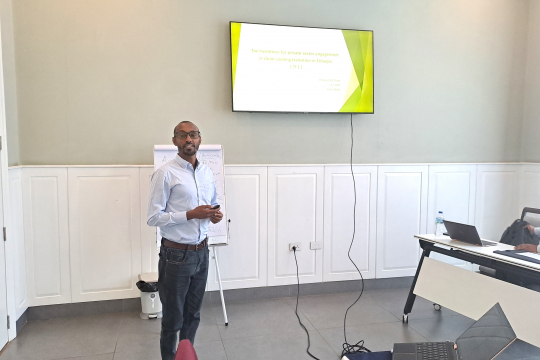IGE alumni and fellows convened to discuss transformation initiatives, which focused on tax exemption and improving finance access to the private sector, and celebrated the 2023 IGE Fellow Graduation.
The Environment and Climate Research Center (ECRC) which hosts EfD Ethiopia organized a half-day National Inclusive Green Economy (IGE) forum on July 7 bringing together and strengthening collaboration between senior research fellows, IGE alumni, and current IGE fellows. The 2023 IGE fellows presented their transformation initiatives, which focused on tax exemptions to promote clean technology adoption and improved access to finance for the private sector.
To accelerate the adoption of clean cooking technologies, IGE fellows examined the potential of tax incentives to drive private sector engagement in the clean cooking transition. On behalf of the 2023 IGE fellows Abrham Tessema (IGE Fellow 2023) said that while the country’s heavy reliance on biomass was pivotal in changing national policies that eased access to cleaning cooking solutions, it is equally important to tax-exempt clean cooking technologies by dropping the 35 percent customs tariff to address the biomass challenge.
Tagay Hamza (IGE Fellow 2023) underscored the importance of exploring diverse financing mechanisms to accelerate private sector involvement in sustainable energy transition. Citing successful interventions in Kenya, Uganda, Rwanda, and Tanzania where financing for the private sector was mobilized, Tagay called for a deliberate change in policy by emulating these countries and fast-track sustainable energy transitions by easing private sector access to finance.
While presenting an overview of the critical role of energy efficiency in reducing energy consumption and lowering greenhouse gas emissions, Mr. Asaye Ketema (Policy Engagement Specialist) explained that the purpose of the workshop was to initiate dialogue and identify the sector for this year's TI and issues hampering the country’s effort to increase energy efficiency and reduce emissions. He said that for Ethiopia to achieve its energy-efficient targets it needs to abide by both national and international commitments and address barriers such as Lack of product energy efficiency test procedures, standards, policy instruments (incentives), no actions towards non-compliance and labels, Lack of adequate verification procedures for products (energy) quality and Lack of distribution and retailers’ awareness of product energy efficiency.
In consideration of energy efficiency and reduced emissions during the 2024 transformation initiatives, the participants prioritized the following sectors:
Industry (cement production) – This is Ethiopia’s major electricity consumer. Cement production is known for huge losses due to high-energy inefficiency. Therefore, a policy instrument encouraging or incentivizing industries to adopt energy-efficient technologies should be proposed.
Transport sector – the government is committed to shifting from fuel-based vehicles to electric vehicles. However, there are still limited charging stations inside and outside Addis Ababa. So, it will be timely to develop policy instruments, that incentivize the private sector, and support the establishment and expansion of charging station infrastructure.
Residential sector (Injera Mitad technology) - Much of the electricity consumed by households is mainly due to energy-inefficient Injera Mitad technology. While there is a Minimum Energy Performance Standard and Energy Labeling for electric stoves, the Mitad technology enforcement remains weak.
Commercial sector - In this sector businesses like restaurants heavily rely on biomass energy sources. It is prudent to propose policy instruments to encourage such sectors to shift from biomass to clean energy sources.
In his closing remarks, Mr. Alebel Dessie, Deputy Director General of the Policy Studies Institute, emphasized the need to unlock private sector engagement stating it is crucial in accelerating the transition to sustainable energy solutions, adding that a comprehensive assessment will be required to provide invaluable insights to inform policy and garner support for the private sector role in this transformative journey.
He commended the graduating cohort for completing the year-long capacity development program and awarded certificates of completion.
By: Asaye Ketema
